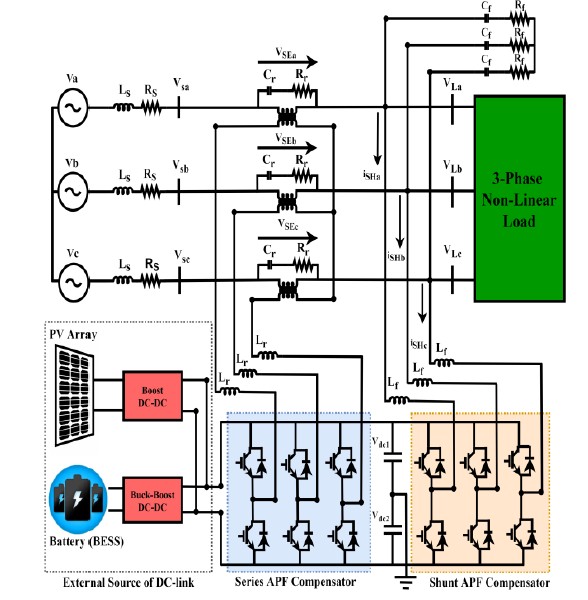Construction and Performance Investigation of Three-Phase Solar PV and Battery Energy Storage System Integrated UPQC
Objective
Main objective of this project is to mitigate the power quality problems existing in the grid and the harmonics penetrated by the non-linear loads. Providing power especially during the longer-term voltage interruption.
Abstract
In this project, to mitigate the power quality problems existed in the grid and the harmonics penetrated by the non-linear loads, a Unified Power Quality Conditioner (UPQC) is proposed. The UPQC is integrated with Photovoltaic (PV) and Battery Energy Storage System (BESS). Generally, the PV system supplies the active power to the load. However, if the PV is unable to supply the power then the BESS activates and provides power especially during the longer-term voltage interruption.
The standalone PV-UPQC system is less reliable compared to a hybrid PV-BESS system because of its instability and high environment-dependency. Therefore, BESS will improve the voltage support capability continuously in the longer-term, reduce the complexity of the DC-link voltage regulation algorithm, and keep producing clean energy.
The phase synchronization operation of the UPQC controller is directed by a Self-Tuning Filter (STF) integrated with the Unit Vector Generator (UVG) technique. Implementation of STF will make sure the UPQC can successfully operate under unbalanced and distorted grid voltage conditions. Thus, the requirement of a Phase-Locked Loop (PLL) is omitted and the STF-UVG is utilized to produce the synchronization phases for the series and shunt Active Power Filter (APF) compensator in UPQC controller. Finally, the proposed STF-UVG method is compared with the conventional Synchronous References Frame (SRF-PLL) method based UPQC to show the significance of the proposed technique. Several case studies are further considered to validate the study in MATLAB-Simulink software.
Keywords: Battery Energy Storage System (BESS), Power Quality, Self-Tuning Filter (STF), Solar Photovoltaic (PV), Unified Power Quality Conditioner (UPQC).
NOTE: Without the concern of our team, please don't submit to the college. This Abstract varies based on student requirements.
Block Diagram

Specifications
Software Configuration:
Operating System : Windows 7/8/10
Application Software : Matlab/Simulink
Hardware Configuration:
RAM : 8 GB / 4 GB (Min)
Processor : I3 / I5(Mostly prefer)
Learning Outcomes
- Introduction to Matlab/Simulink
- What is EISPACK & LINPACK
- How to start with MATLAB
- About Matlab language
- About tools & libraries
- Application of Matlab/Simulink
- About Matlab desktop
- Features of Matlab/Simulink
- Basics on Matlab/Simulink
- Introduction to Distribution Generation
Systems
- Introduction to Renewable Energy Sources
- Introduction to Solar Power System
- Introduction to MPPT.
- Introduction to MicriGrids
- Introduction to distributed incremental
adaptive filter(DIAF)
- Introduction to PV power feed-forward
(PVFF) term
- Introduction to Types of Batteries.
- Introduction to Battery energy Storage
(BES).
- Introduction to Point of Common Coupling
(PCC)
- Introduction to Pulse Width Modulation
(PWM),
- Design of Solar Panel.
- How to
implement boost converter control?
- We can learn about the Grid
Synchronization and Islanding Control
- Introduction to open loop and closed
loop control system
- Introduction to bidirectional converter
- Introduction to RC Filters
- Introduction to Voltage Source
Converters (VSC)
- We can learn about PI Controllers
- We can learn about different types of
loads.
- We can learn about Mathematical model of
Solar panel
- Project Development Skills:
- Problem analyzing skills
- Problem solving skills
- Creativity and imaginary skills
- Programming skills
- Deployment
- Testing skills
- Debugging skills
- Project presentation skills
- Thesis writing skills


 Paper Publishing
Paper Publishing
